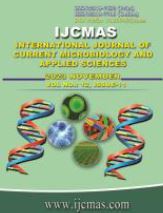


 National Academy of Agricultural Sciences (NAAS)
National Academy of Agricultural Sciences (NAAS)

|
PRINT ISSN : 2319-7692
Online ISSN : 2319-7706 Issues : 12 per year Publisher : Excellent Publishers Email : editorijcmas@gmail.com / submit@ijcmas.com Editor-in-chief: Dr.M.Prakash Index Copernicus ICV 2018: 95.39 NAAS RATING 2020: 5.38 |
Marine organisms are a great source of bioactive substances. Due to the increasing number of structurally unique and biomedically intriguing natural products that are being isolated from marine sources, the area of marine natural products has been rising. In the present study the antimicrobial activity of the mud crab (Scylla serrata) was investigated. In this study mud crab (Scylla serrata) was collected from mangroves of Karwar, west coast of Karnataka-India, and haemolymph was extracted and examined for bioactivity against E.faecalis strains. The antibiotic gentamycin was used along with the least dilution of 10µl along with the strains. The haemolymph extract was added of dilution 20µl and the pure culture was of 20µl respectively. The results showed that the size of the colony as compared to the antibiotic gentamycin and haemolymph extract with E. faecalis strains were showing decreased in the cell size as compared to the standard culture (E. faecalis) they appeared in the scanning electron microscopic images. Hence the present study shows that the haemolymph of the mud crab has potential antibiotics.
 |
 |
 |
 |
 |